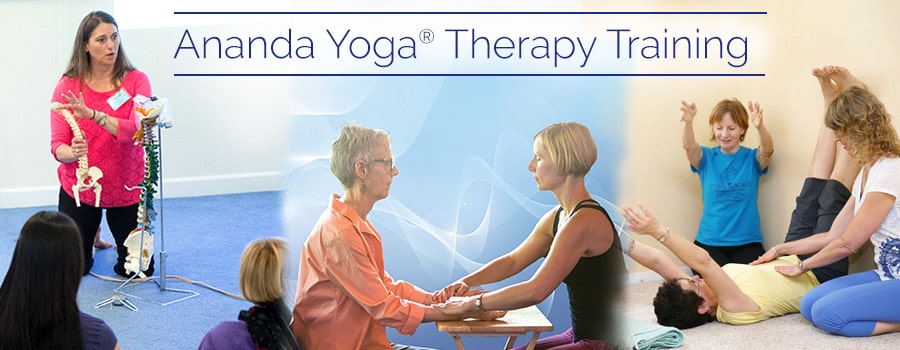SYLLABUS
Ananda Yoga® Therapy Training: Musculoskeletal-2
We are not currently accepting new students in the Ananda Yoga Therapy Training
Course Hours: Total = 41 (Residential and Distance)
- Residential: 31 (with 13 hours Practicum)
- Distance: 10 (pre-course Distance Module)
- Practicum: 13 (Residential)
Prerequisites
- Enrollment in the Ananda Yoga® Therapy Training program, AND,
- Ananda Yoga® Therapy Training: Principles, AND,
- Ananda Yoga® Therapy Training: Musculoskeletal-1
Teaching Format
Prior to the residential section of this course, students will be required to view online yoga training videos, which include Power Point and lecture, case studies, therapeutic intervention instruction, professional development and assignment information. Students will be required to do a number of tasks such as note taking during the online case studies, take quizzes, write reflection essays and do research on an assigned topic, which will culminate in a live talk/presentation during the residential aspect of their program. During the residential portion of the course there will be follow-up on the assignments from the online training, as well as their practicum, which was assigned in Musculoskeletal I. All students are required to participate in the discussions. They will be trained in more acute care and hands on training. Private session and group sessions training will include lots of time for students to practice teaching with peer and faculty observation and feedback. There will be a clinic/practicum where they will teach both group and private sessions under supervision of faculty with a focus on integrating and practicing learned concepts, techniques and skills.
Faculty
Nicole DeAvilla E-RYT 500, RPYT, RCYT, Yoga Therapist, C-IAYT
Required Texts/Reading Materials
Ananda Yoga Therapy Training: Musculoskeletal-1 Manual, 2018, which includes the Ananda Musculoskeletal Workbook, based on the work of Nicole DeAvilla, fully illustrated with drawings and photos by Barbara Bingham (140+ pages) handouts written by Ananda Faculty, articles, research papers, and forms for intake, evaluation and other resources. This binder is included with the course.
Learning Objectives
By the end of this course students will be able to:
- Competently work with student/clients with musculoskeletal issues in private session setting, a group class and group classes in hospital or clinic environments.
- Design class plans as well as adapt their plans to new situations that student/clients may present.
- Work with more acute cases and know when to refer to another health care provider.
- Apply a wide variety of yoga therapy interventions to best suit the needs of the musculoskeletal compromised client/student.
- Demonstrate the ability to research unfamiliar conditions and be able to present and discuss with peers and other health care providers your findings as well know how to assist your clients with the condition.
Course Description
This course focuses on integrating subject matter learned and putting it into practical use for student/clients with primarily musculoskeletal issues. It builds upon the knowledge gained in Musculoskeletal I and their assigned practicum experiences. Anatomy and physiology are reviewed in the context of working with clients and communicating with health care providers. Students will have opportunities to practice intake, evaluating, critical thinking skills, communication, lead and teach appropriate yoga therapy techniques including both subtle and gross interventions, conduct sessions, provide daily living advice, and give homework/home routines as appropriate to clients’ needs, constitution and circumstances, and follow-up.
The course mainly focuses on the competencies in section 3 and 4. However, integration of other competencies is included.
Subject Matter/IAYT Competencies Covered
Section 1. Yoga Foundations
Category 1.3. Framework for Health and Disease
1.3.1 Knowledge of the basic perspectives on health and disease from yoga and Ayurveda relevant to the practice of yoga therapy, including the concepts of
1.3.1.1 panca maya (kosha) (fundamental structure of the human system);
1.3.1.2 subtle anatomy;
1.3.1.3 tri-dosha (effect of the elements on the physical body);
1.3.1.4 tri-guna (effect of sattva (equilibrium), rajas (activity), tamas [(inertia]);
1.3.1.5 prakrti/vikrti (dosha constitution at birth/imbalance of the dosha currently expressed in the body);
1.3.1.6 ama (undigested food, emotions, etc. accumulated in the body);
1.3.1.7 agni (internal fire(s) and their contribution to health);
1.3.1.8 prana vayu (prana, apana, vyana, udana,samana);
1.3.1.9 prana prakopa (disturbance of the vayu);
1.3.1.10 surya/chandra (sun/moon);
1.3.1.11 brmhana/langhana (expansion/contraction); and
1.3.1.12 vyuha model: heya (the symptoms), hetu (the causes), hana (the goal), upaya (the tools).
1.3.2 Knowledge of categorizing illness, including
1.3.2.1 Development/evolution of disease (samprapti [pathogenisis], including but not limited to direction, intensity, onset, and duration and their influence on the ease or difficulty of healing and disease management.
1.3.2.2 Setting priorities: symptoms/pacification (shamana [short term]) and purification/strengthening (shodhana [long term]).
Section 2. Biomedical and Psychological Foundations
Category 2.1. Anatomy and Physiology
2.1.1 Knowledge of human anatomy and physiology, including all major systems of the body and their interrelationships, as relevant to the work of a yoga therapist.
2.1.2 Knowledge of biomechanics and movement as they relate to the practice of yoga and the work of a yoga therapist.
2.1.3 Knowledge of common pathologies and disorders of all the major systems, including symptoms, management, illness trajectories, and contraindications, as relevant to the work of a yoga therapist.
Category 2.2. Additional Biomedical Knowledge
2.2.1 Familiarity with commonly used drugs and surgical procedures, as relevant to the work of a yoga therapist.
2.2.2 Familiarity with common medical terminology.
2.2.3 Knowledge of how to reference current healthcare information relevant to the work of a yoga therapist, including pathologies, disorders, drugs, and surgical procedures, as relevant to the work of a yoga therapist.
Category 2.4. Additional Knowledge
2.4.2 Familiarity with the influence of familial, social, cultural, and religious conditioning on mental and medical perspectives of health and healing.
Category 2.5. Body and Mind Integration
2.5.1 Knowledge of the interaction of the body, breath, mind, intellect, and emotions in health and well-being.
Section 3. Yoga Therapy Tools and Therapeutic Skills
Category 3.1. Yoga Practices
3.1.1 In-depth knowledge of the application of yama and niyama.
3.1.2 In-depth knowledge of the range of yoga practices and their potential therapeutic effects for common conditions Practices may include, but are not limited to,
3.1.2.1 Asana (postures);
3.1.2.2 Pranayama (regulated breathing);
3.1.2.3 Meditation and relaxation techniques such as bhavana (visualization), mantra (recitation), and ritualized activities such as nyasa and mudra; and
3.1.2.4 Vihara (lifestyle modifications) including basic yogic dietary concepts.
3.1.3 In-depth knowledge of contraindications of yoga practices for specific
conditions and circumstances.
Category 3.2. Basic Principles of the Therapeutic Relationship
3.2.1. In-depth knowledge of, and observed capacity for, well-developed communication skills:
listening, presence, directive and non-directive dialogue.
3.2.2. Demonstrated ability to recognize, adjust, and adapt to specific client/student needs in the evolving therapeutic/professional relationship.
3.2.3. Demonstrated ability to recognize and manage the subtle dynamics inherent in the therapist/client relationship.
3.2.4. In-depth Knowledge of the scope of practice of yoga therapy and how to assess the need for referral to other professional services.
Category 3.3. Principles and Skills for Educating Clients/Students
3.3.1. In-depth knowledge of and demonstrated ability to implement effective teaching methods, adapt to unique styles of learning, provide supportive and effective feedback, acknowledge the client's/student's progress, and cope with unique difficulties/successes.
3.3.2. In-depth knowledge of and demonstrated ability to transmit the value of self-awareness and self- responsibility throughout the therapeutic process.
3.3.3. In-depth knowledge of and demonstrated ability to develop and adjust appropriate practice strategies to the client/student.
Category 3.4. Principles and Skills for Working with Groups
3.4.1. Basic knowledge of and demonstrated ability to design, implement, and evaluate group programs.
3.4.2. Familiarity with group dynamics and techniques, including communication skills, time management, and the establishment of priorities and boundaries, as well as techniques to address the specific needs of individual participants, to the degree possible in a group setting.
Section 4. Practicum
Category 4.1. Provide Yoga Therapy
4.1.1. Demonstrated ability to conduct intake and assess the client/student, including
4.1.1.1. Taking a history of the client and his/her condition(s); and
4.1.1.2. Assessing the current condition using the tools relevant to the yoga therapist, including an evaluation of the physical, energetic, mental, emotional, and spiritual dimensions of well-being.
4.1.2. Demonstrated ability to elicit the goals, expectations, and aspirations of the client/student.
4.1.3. Demonstrated ability to integrate information from the intake, evaluation, and observation to develop a working assessment of the client's condition, limitations, and possibilities.
4.1.4. Demonstrated ability to apply knowledge of how to determine which aspects of the client/student's conditions, goals, and aspirations might be addressed through yoga therapy.
4.1.5. Demonstrated ability to identify priorities and set both long- and short-term goals with the client/student.
4.1.6. Demonstrated ability to apply knowledge of pacification, purification, and strengthening strategies.
4.1.7. Demonstrated ability to apply knowledge of strategies that address common disorders and pathologies of the major human systems and common mental health conditions, as well as other goals and aspirations of the student as relevant to the work of a yoga therapist.
4.1.8. Demonstrated ability to apply knowledge of how to combine intake, evaluation, observations, and working assessment to develop an appropriate practice or session strategy for individual clients/students as well as group classes, taking into consideration the holistic nature of the individual.
4.1.9. Demonstrated knowledge of how to choose and prioritize the use of yoga tools and techniques, including selecting, sequencing, adapting, and modifying yoga practices appropriate to the needs of clients.
4.1.10. Demonstrated ability to teach or deliver the appropriate practices for individuals as well as groups, taking into consideration the assessment of their conditions, limitations, possibilities, and the overall practice strategy.
4.1.11. Demonstrated ability to facilitate the client/student's experience of the practice, including
4.1.11.1. providing instruction, demonstration, education of the client/student using multimodal strategies of education such as auditory, visual, and kinesthetic learning tools; and
4.1.11.2. Providing supportive strategies for the client/student to actively participate in his/her practice, such as a means to remember his/her practice (e.g., auditory and visual tools).
4.1.12. Demonstrated ability to develop and maintain therapeutic relationships including
4.1.12.1. Fostering trust by establishing an appropriate therapeutic environment through privacy, confidentiality, and safety; and
4.1.12.2. Practicing effective, client/student-centered communication based upon a respect for, and sensitivity to, individual, familial, cultural, social, ethnic, and religious factors.
4.1.13. Demonstrated ability to provide follow up and re-planning, including
4.1.13.1. Gathering feedback, re-assess, and refine the practice and to determine short-term and long-term goals and priorities;
4.1.13.2. Addressing new and changing conditions, goals, aspirations, and priorities of the student/client and to provide appropriate support; and
4.1.13.3. Providing appropriate closure for the therapy sessions.
Section 5. Professional Practice
Category 5.1. Ethical Principles
5.1.1. In-depth knowledge of yoga practices and methods for self-inquiry related to establishing, practicing, and maintaining ethical principles.
5.1.2. In-depth knowledge of generally accepted ethical principles of health care codes of conduct and yoga's ethical principles.
5.1.3. Demonstrated ability to apply knowledge of generally accepted ethical principles and related concepts from the yoga tradition to professional interactions and relationships.
5.1.4 In-depth knowledge of the scope of practice of yoga therapy, resulting in the demonstrated ability to discern the need for referral to other modalities.
5.1.5. Knowledge of the extent of one's own individual training, skills, and evolving experience in yoga therapy, and knowledge of the importance of practicing within such parameters.
Category 5.2. Legal, Regulatory, and Business Issues Pertaining to Yoga Therapy
5.2.1 Knowledge of current relevant local, state, and national laws and regulations impacting the work of a yoga therapist.
5.2.2 Basic knowledge of business practices relevant to the work of a yoga therapist, including record keeping, planning, and financial management.
Category 5.3. Relationships with Peers, Mentors, Clinicians, and
Organizations
5.3.1. Basic knowledge of other healthcare fields and their potential role in and relevance to the work of a yoga therapist.
5.3.2. Basic knowledge of how to establish, maintain, and utilize a referral network of peers and related healthcare practitioners and organizations.
5.3.3. Basic knowledge of how to develop and maintain ongoing collaborative relationships.
Category 5.4. Personal and Professional Development and Continuing Education
5.4.1. Knowledge of the fundamental value of ongoing personal practice, long-term mentorship, and skills maintenance/development through continuing education.
5.4.2. Knowledge of when and how to seek advice and support for case consultation, educational advancement, and personal practice.
Course Completion Requirements
Assignments given in the online portion of the training include, note taking, answering questions, reflection, quizzes and research of an assigned musculoskeletal issue. These assignments are to be completed and handed in electronically 2-4 weeks before the residential portion. During the residential portion students must give a short talk 5-10 minutes on their assigned musculoskeletal issue. They must complete all observed practicum hours of the course and deliver musculoskeletal yoga therapy interventions to meet the IAYT competencies and the level of care and safety and spiritual sensitivity required of Ananda Yoga Therapists. There will be ongoing assessment of their skills throughout the course. Safety for clients is a priority.
To pass students need to be assessed at 80% or higher. If they fall below these expectations they will be given additional assignments and/or be required to complete some or all of the course (which may incur additional residential costs) or complete extra assignments to demonstrate adequate improvement and competency.
Ananda Yoga Therapy Training
- Overview
- Flow Chart of Ananda Yoga® Therapy Training Courses
- Course Syllabi
- Tuition Costs
- Ananda Yoga® Therapy Training Courses Scheduled
- Frequent Questions
- Instructors
- Apply for Level 1
- Student Handbook with Costs
- Bridge to Ananda Yoga
Upcoming Courses in date order
- Bhagavad Gita Retreat
- The Essence of the Yoga Sutras According to Paramhansa Yogananda
- Ananda Meditation® Teacher Training - In Person
- Advanced Pranayama
- Ananda Yoga® Assistantship
- Ananda Yoga® Therapy Training: Principles
- Ananda Yoga® Advanced Training: Therapeutic Yoga for Seniors and Bone Strength
- Restorative Ananda Yoga® Teacher Training - In Person
- Ananda Yoga® Therapy Training: Musculoskeletal–1
- Ananda Yoga® Therapy Training Online: Ayurveda
- Ananda Yoga® Therapy Training Online: Health Challenges–1
- Ananda Meditation® Solutions
- Ananda Spiritual Counseling® Training - In Person
- Ananda Yoga® Therapy Training: Musculoskeletal–2
- Ananda Yoga® Therapy Training Online: Health Challenges–2
- Ananda Yoga® Therapy Training: Psychology and Mental Health
- Ananda Yoga® Therapy Training: Holistic Health Therapist Training
Nursing CEU Eligible: details coming

How to Choose a
Yoga Teacher Training Program

“My 4 weeks of Ananda Yoga Teacher Training was one of the most fulfilling and spiritually transforming periods in my life. All of the faculty, along with the entire Ananda community, were very supportive and nurturing.” – R. F., Lake Bluff, IL.

Testimonial for the Ananda Yoga Therapy Training Program
“The program is all embracing ˜ asana, ayurveda, chakras, special health issues touching on body, mind, and spirit. The instructors were wonderful, knowledgeable, supportive, and enthusiastic.” – T.C., CA.







The yoga therapy components of these courses are based on our accreditation by IAYT, not derived from our status as an RYS with Yoga Alliance Registry.


CONNECT
14618 Tyler Foote Rd
Nevada City, California 95959
Toll free 800-346-5350
Outside US 530-478-7518
LEARN MORE
SUBSCRIBE
Receive uplifting emails with inspirational content and news about our retreat programs, travels, and trainings.
















